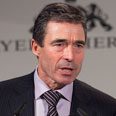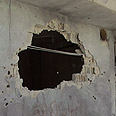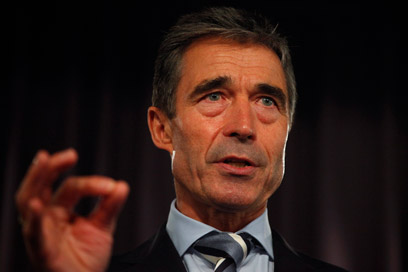

NATO chief Anders Fogh Rasmussen said Wednesday that foreign military intervention was “not the right path” in Syria despite the UN's peacekeeping chief declaring the country in civil war.
Rasmussen said there were "no plans at this stage" for a NATO operation, as he condemned the UN Security Council failure to reach agreement as a "big mistake", saying Russia could have an "instrumental role" in brokering peace.
Related stories:
- 'Assad regime lost large chunks of territory in cities'
- US fears another massacre in Syria
- Op-ed: Who will replace Assad?
"A foreign military intervention is not the right path in Syria," the NATO chief said in a speech to Australian journalists, calling instead for a political solution as envisaged by UN-Arab League envoy Kofi Annan.

Rasmussen. Criticizes Security Council (Photo: EPA)
"Having said that, I strongly condemn the behavior of the Syrian security forces and the crackdown on the civilian population.
"It is absolutely outrageous what we are witnessing and (there is) no doubt that the regime in Syria is responsible for violations of the international law," he added.
"I strongly urge the Syrian leadership to accommodate the legitimate aspirations of the Syrian people and introduce freedom and democracy." Rasmussen, who is visiting close NATO ally Australia, said he was not sure "from a legal point of view" whether what was happening could be considered civil war, as claimed by UN peacekeeping chief Herve Ladsous.
Groping for solution
"But definitely and very clearly the situation is Syria is very serious, and we have seen horrendous acts conducted by the regime and forces loyal to the regime and I strongly condemn these acts." Activists say some 14,100 people have now been killed in the uprising against the Assad family, which has ruled Syria for some four decades.
World powers are groping to find a way to end the bloodshed with the toll growing daily despite a ceasefire that should have gone into effect from Apr.12, and amid reports of children being used as human shields.
Ladsous said there had been such a massive increase in violence that "it indicates some change of nature" of the conflict, agreeing it could be seen as a civil war.
Without a change to the escalating violence US Secretary of State Hillary Clinton has questioned whether it would be feasible to extend the UN mission in Syria once its 90-day mandate expires on July 20.
Clinton has also accused Russia, a longstanding ally of Syria, of helping to escalate the violence by sending attack helicopters to President Bashar Assad's military forces.
Rasmussen, too, had a "very clear message" for Russia, saying it could play a pivotal role in facilitating a political solution and had a responsibility to wield its influence “and live up to (its) international obligations”.
"I strongly regret that the UN Security Council failed to reach an agreement on a legally binding resolution on Syria. I think that failure sends a very unfortunate, not to say dangerous, signal to the Assad regime," he said.
- Receive Ynetnews updates
directly to your desktop















